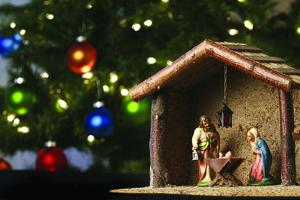

Signs of spring are slowly appearing (with some continued cold weather) From top to bottom, left to right – daffodils, sycamore, Japanese magnolia,ice!,dogwood
Pictures and text from this Sunday, Jan. 27, 2019
The Week Ahead…
Jan. 30 – 10:00-12pm – Ecumenical Bible Study
Feb. 3 – 10am – Adult Education – Good Book Club – Romans
Feb. 3 – 10am – Children’s Education Living the Good News
Feb. 3 – 11am – Holy Eucharist, Epiphany 4
Feb. 3 – 12pm – Souper Bowl Collection
Feb. 3 – 12pm – Coffee Hour Potluck at the Heimbach home
Sunday, Feb. 3 Readings and Servers
Reading Romans during Epiphany

Read Romans during Epiphany which began Jan. 7. This is sponsored by Forward Movement, the people who make “Day by Day” and encouraged throughout the Episcopal Church. They call the initiative the “Good Book Club.”
We covered chapters 1 and 2 on Jan 20 and hope to get through Chapter 5 on Feb 3. (There’s your assignment!)
Why Read Romans ?
from J. I. Packer, Canadian Theologian.
Paul’s primary theme in Romans is the basic gospel, God’s plan of salvation and righteousness for all humankind, Jew and Gentile alike.
Paul’s purposes for writing this letter were varied:
1. He wrote to prepare the way for his coming visit to Rome and his proposed mission to Spain (1:10-15; 15:22-29).
2. He wrote to present the basic system of salvation to a church that had not received the teaching of an apostle before.
3. He sought to explain the relationship between Jew and Gentile in God’s overall plan of redemption. The Jewish Christians were being rejected by the larger Gentile group in the church because the Jewish believers still felt constrained to observe dietary laws and sacred days.
There are 50 daily readings here from January 7 to March 5. The readings are in manageable chunks plus there are resources to help you along the way.
Links
1. The Readings
3. Catherine’s Roman’s Outline
4. Catherine’s Roman’s Study Guide
Epiphany – Jan 6 until Lent begins March 6, 2019

Adoration of the Magi – Bartholomäus Zeitblom (c. 1450 – c. 1519)
The English word “Epiphany” comes from the Greek word epiphaneia, which means “appearing” or “revealing.” Epiphany focuses on God’s self-revelation in Christ.
Epiphany celebrates the twelfth day of Christmas, the coming of the Magi to give homage to God’s Beloved Child.
The Epiphany celebration remembers the three miracles that manifest the divinity of Christ. The celebration originated in the Eastern Church in AD 361, beginning as a commemoration of the birth of Christ. Later, additional meanings were added – the visit of the three Magi, Christ’s baptism in the Jordan River with the voice from heaven that identifies Jesus as God’s son, and his first miracle at the wedding in Cana. These three events are central to the definition of Epiphany, and its meaning is drawn from these occurrences.
Presentation of Jesus in the Temple and Candlemas

“Today is a day of purification, renewal, and hope.”
The Presentation of our Lord commemorates when Mary and Joseph brought the infant Jesus to the Temple in Jerusalem where he was greeted by Simeon and Anna. By the Law every first born male was to be consecrated to the Lord.” This happened 40 days after his birth at Christmas.
It is a feast day though it does not often fall on a Sunday. Candlemas occurs at a period between the December solstice and the March equinox, so many people traditionally marked that time of the year as winter’s “halfway point” while waiting for the spring.
Candlemas is actually a very old feast, celebrated by both the churches of the East and the West, and in some places it is on this day that the creche is finally removed from the church. The passage from The words in this scripture are often part of Compline
According to some sources, Christians began Candlemas in Jerusalem as early as the fourth century and the lighting of candles began in the fifth century. Other sources say that Candlemas was observed by blessing candles since the 11th century. An early writing dating back to around 380 CE mentioned that a feast of the Presentation occurred in a church in Jerusalem. It was observed on February 14. The feast was observed on February 2 in regions where Christ’s birth was celebrated on December 25. It is also Groundhog Day in the United States and Canada on February 2.
Candles are blessed on this day (hence the name “Candlemas”). It was the day of the year when all the candles, that were used in the church during the coming year, were brought into church and a blessing was said over them – so it was the Festival Day (or ‘mass’) of the Candles. Candles were important in those days not only because there was no electric lights. Some people thought they gave protection against plague and illness and famine. For Christians, they were (and still are) a reminder of something even more important. Before Jesus came to earth, it was as if everyone was ‘in the dark’.
Pieces of these candles are considered of great efficacy in sickness, or otherwise. When a person is dying, a piece is put in his hand lighted, and thus he passes away in the belief that it may light him to Paradise.
Coming this Sunday, Feb. 3…

"If anyone has material possessions and sees his brother in need but has no pity on him, how can the love of God be in him?"– 1 John 3:17.
"Souper Bowl of Caring" is an annual fundraising drive organized in partnership with the NFL. It focuses attention on the issues of hunger and poverty in our community and throughout the world. 149 million will tune into the big game but there are 50 million facing hungry. We would like to "change the game" from hunger to abundance.
It began 29 years ago with a simple prayer : “Lord as we enjoy the Super Bowl, help us to be mindful of those without a bowl of soup to eat.” Souper Bowl evolved into a separate non-profit. During "Souper Bowl of Caring 2019", schools, faith-based organizations and service clubs throughout the United States raised over $8 million that was donated to local charities. There is online video about the program –
St. Peter’s began participating in 2012 so this is our 7th year. The money and food we collect stays local and benefits Caroline County since the proceeds will go to our Village Harvest Food ministry.
Here is our recent record:

You can check out our entire record here
On Sunday Feb 3, 2019, please make a separate donation at the offertory (with “Souperbowl” in the memo line) or bring in some food for this worthy cause. Our costs average approximately $140 a month so we would appreciate your donations. The youth will be collecting both donations and food outside at the conclusion of the service.
Lectionary, Feb. 3, 2019
I. Theme – The power given us through God’s love and presence.

Brow of the Hill Near Nazareth" ” – James Tissot (1886-1894)
"When they heard this, all in the synagogue were filled with rage. They got up, drove him out of the town, and led him to the brow of the hill on which their town was built, so that they might hurl him off the cliff. But he passed through the midst of them and went on his way." – Luke 4:28-30
The lectionary readings are here or individually:
Old Testament – Jeremiah 1:4-10
Psalm – Psalm 71:1-6
Epistle – 1 Corinthians 13:1-13
Gospel – Luke 4:21-30
Today’s readings reveal the power given us through God’s love and presence. Jeremiah protests his call to prophesy, but God commands him to speak boldly. Paul teaches a quarreling community that, while all the spiritual gifts have value, respect and love for each other deeply empower us. Jesus proclaims that the power of his ministry will not be confined to his hometown or even to his faith community.
The two major themes in this week’s reading stand out in clear relief: Firstly, God’s grace is not always a comfortable and gentle thing to experience. Integral to God’s grace is the work of justice which distresses the comfortable and self-assured (the "no") even as it comforts the distressed (the "yes"). Jeremiah is told that his message will not only build up but break down; The psalmist reflects on his vulnerability and the threat of evil in spite of his long life of relationship with God; The love that Paul speaks about is not an easy or comfortable way to follow, but challenges our self-centredness and lethargy toward others; and finally, Jesus makes it clear that his ministry is not “friendly” and non-disruptive, but a life-changing, all-inclusive confrontation of self-righteousness and injustice
Secondly, as with Jesus’ near execution in Luke, those who choose to follow Christ in his liberating work, must expect that they will find themselves in confrontation with injustice and those who propagate it. This will inevitably lead to great sacrifice and suffering. The work of grace is not all acceptance and healing. Sometimes it is a wounding battle – not least because we are called to love even those we challenge

2. Contact the Rev Catherine Hicks, Rector 5. Latest Newsletter-the Parish Post (Feb., 2019) 6. Calendar 9. Latest Sunday Bulletin (Feb. 3, 2019 11:00am), and Sermon (Jan. 27, 2019) 10. Recent Services: |

Block Print by Mike Newman
Projects
| Colors | Season | Dates | |
|---|---|---|---|
| White | Gold | Christmas | Dec 25-Jan 5 |
| White | Gold | Epiphany | Jan 6 |
| Green | After Epiphany | Jan 7-March 2 | |


3-Minute Retreats invite you to take a short prayer break right at your computer. Spend some quiet time reflecting on a Scripture passage.
Knowing that not everyone prays at the same pace, you have control over the pace of the retreat. After each screen, a Continue button will appear. Click it when you are ready to move on. If you are new to online prayer, the basic timing of the screens will guide you through the experience.

Daily meditations in words and music.

Your daily prayer online, since 1999
“We invite you to make a ‘Sacred Space’ in your day, praying here and now, as you visit our website, with the help of scripture chosen every day and on-screen guidance.”

Saints of the Week, Jan. 27 – Feb. 3
|
27
|
John Chrysostom, Bishop & Theologian, 407 |
|
28
28 |
Thomas Aquinas, Priest and Friar, 1274 Isaac of Nineveh, Bishop & Mystic, c.700 |
|
29
|
Andrei Rublev, Monk and Iconographer, 1430 |
|
30
|
|
|
31
|
Marcella of Rome, Monastic & Scholar, 410 John Bosco, Priest, 1888 Samuel Shoemaker, Priest and Evangelist, 1963 |
|
1
|
Brigid of Kildare, Monastic, 523 |
|
2
2 |
The Presentation of Our Lord Jesus Christ in the Temple Esther John (Qamar Zia), Nurse & Martyr, 1960 |
|
3
|
The Dorchester Chaplains: Lieutenant George Fox, Lieutenant Alexander D. Goode, Lieutenant Clark V. Poling and Lieutenant John P. Washington, 1943 |
|
3
|
Anskar, Archbishop & Missionary, 865 |


















































































